- News
- Reviews
- Bikes
- Components
- Bar tape & grips
- Bottom brackets
- Brake & gear cables
- Brake & STI levers
- Brake pads & spares
- Brakes
- Cassettes & freewheels
- Chains
- Chainsets & chainrings
- Derailleurs - front
- Derailleurs - rear
- Forks
- Gear levers & shifters
- Groupsets
- Handlebars & extensions
- Headsets
- Hubs
- Inner tubes
- Pedals
- Quick releases & skewers
- Saddles
- Seatposts
- Stems
- Wheels
- Tyres
- Tubeless valves
- Accessories
- Accessories - misc
- Computer mounts
- Bags
- Bar ends
- Bike bags & cases
- Bottle cages
- Bottles
- Cameras
- Car racks
- Child seats
- Computers
- Glasses
- GPS units
- Helmets
- Lights - front
- Lights - rear
- Lights - sets
- Locks
- Mirrors
- Mudguards
- Racks
- Pumps & CO2 inflators
- Puncture kits
- Reflectives
- Smart watches
- Stands and racks
- Trailers
- Clothing
- Health, fitness and nutrition
- Tools and workshop
- Miscellaneous
- Buyers Guides
- Features
- Forum
- Recommends
- Podcast
OPINION
Why I risk prison to make our roads safer and save our planet – a campaigner tells his story
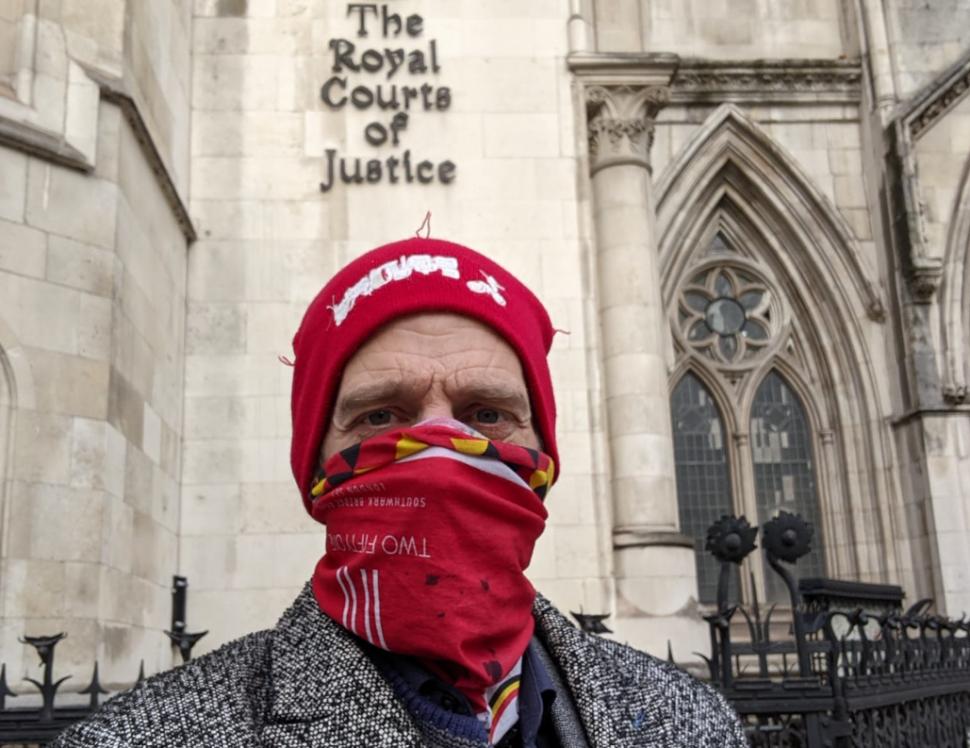 Caspar Hughes
Caspar HughesOne-time London bike courier Caspar Hughes, who went on to found and run the static track bike racing events company Rollapaluza, has diverted his energies in the past few years to campaigning for safer roads for cyclists and, more recently, trying to avert the looming climate catastrophe.
Here, he shares with road.cc readers his journey from courier to campaigner – as well as explaining why he is willing to risk jail to fight for what he believes in. Over to Caspar ...
Earlier this week, I experienced my first visit to the Royal Courts of Justice. It’s an amazing building and very different to my only other experience of courts in the UK, St Albans Magistrates’ Court. I was there to challenge three injunctions from National Highways and Transport for London (TfL) against Insulate Britain).
The injunctions in question include a long list of roads in and around London on which persons named or unknown could be arrested if they take part in any action that slows or disrupts traffic.
So why was I – someone who has been arrested four times in the last three years whilst taking part in peaceful direct action for Extinction Rebellion – in court challenging TfL’s injunctions against Insulate Britain?
It started in 2015 when I was running a cycling events company called Rollapaluza, a period on which I look back with fondness.
I remember reading an article on BikeBiz written by Carlton Reid questioning why so few people in the cycling industry were involved in campaigning. I wondered why I wasn't more involved personally.
A few days later I stumbled upon a bunch of cyclists doing something at a junction on Denmark Hill. I stopped and hung around for a few minutes, asked a few questions but didn’t really learn much. I later realised it was a Die-In for Esther Hartsilver who had been killed at the terrible junction of Orpheus Street and Denmark Hill – a junction that hasn’t changed much since, and six years later it’s still as dangerous as it was back then.
I started to read up on the campaigning landscape and quickly realised how much of a role active travel had to play in making certain roads in cities safer, less polluted and less congested, alongside improving people's physical and mental health.
I also learned that since 2015, transport has been the largest greenhouse gas-emitting sector in the UK.
One of the fundamental ways to reduce emissions from this sector is to prioritise active travel and public transport over private car use. It is currently socially acceptable to take 1.5 tonnes of metal with you to the shops to buy a pint of milk, loaf of bread and a newspaper. This has to change – and change fast – if we are to avoid civilisational collapse in the coming decades.
The comparison between most UK and Dutch cities in particular was amazing.
Two per cent of children in the UK cycle to school; 50 per cent of Dutch kids cycle the same journey, developing a routine of activity from an early age.
This habit makes them far healthier than we are, despite the Dutch love of covering anything in batter, deep frying it and sticking it in a vending machine so it’s available 24/7.
A third of all journeys are cycled in the Netherlands, including by people cycle deep into retirement. Over here, it’s still hovering around 2 per cent. Outside pockets of London, only Cambridge comes anywhere near Dutch levels of cycling.
I was living in Tower Hamlets when I learned of Ying Tao’s death and the Die-Ins that followed.
I turned up to the first one, organised by Stop Killing Cyclists, and I was taken aback by two things.
The first was that there appeared to be hundreds of people hanging around long before it was meant to start – it was far, far bigger than what I had seen in Denmark Hill.
The second was that people were fretting because the PA they’d hired didn’t work, I noticed that the problem was a missing lead to connect the mic to the PA, I knew there was a shop that sold the missing lead locally and one of the volunteers kindly took instructions about what lead to buy and where to go, whilst I started setting everything else up.
That was the first direct action with which I got involved. Since then I’ve helped a small team of volunteers set up and run far too many Die-Ins with Stop Killing Cyclists, and I’ve regularly been brought to tears speaking to people who’ve lost family members because drivers killed them.
We also organised and ran two national funerals for victims of road violence, where horse drawn carriages carried coffins symbolising people who’ve been killed by pollution, emissions, obesity, crashes and disease brought on by inactivity.
I successfully managed to arrange and help negotiate support from Cycling UK, London Cycling Campaign and Extinction Rebellion who generously supported some of our actions that were increasing in their disruptive elements.
In 2016 I moved out of London, back to the West Country. Whilst I was still active with Stop Killing Cyclist my focus turned to my new adopted city of Exeter. I was fortunate in that there was a Cycling Campaign starting in the city in the same year I moved in.
Exeter is tiny – half the population of the central London borough of Tower Hamlets, but spread over twice the area.
Thankfully there are far fewer deaths despite cycled journeys being three times the national average at 6 per cent. But they do happen, about one person walking or cycling is killed in Exeter every other year.
It took me five years to persuade Exeter Cycling Campaign, who are naturally far more conservative (with a small ‘c’) than London’s Stop Killing Cyclists to organise a Die-In.
I did so by explaining that whilst Die-Ins are a form of disruptive direct action, first and foremost they are a ceremony; we pause the hustle and bustle of daily life with a poignant couple of minutes’ silence, whilst we lie down in the road, often where the fatal crash happened, to mark the passing of someone who has been killed by a driver.
Sometimes it’s a teacher, sometimes a nurse, a doctor, a cleaner, a cycle courier … it doesn't matter what they did for a living, they were killed whilst cycling on the roads where it should be safe for us to travel.
I’d estimate that around 90 per cent of these ceremonies were attended by family members of the victims, and often they will speak at these commemorations of their loved ones’ passing … if you’ve ever been to a vigil where that has happened, you’ll know how quickly your eyes can well up listening to them.
Which brings me back to the top. The injunctions that National Highways and TfL brought against Insulate Britain were written in a way that could have included many of the people I’ve written about above. Until our challenge, these injunctions could’ve been interpreted in a way that these people could have faced unlimited fines and up to two years in prison.
I know that the direct action we’ve taken has been effective. Boris Johnson’s mayoral team said that the Stop Killing Cyclists direct action did two things – it generated the conversation amongst the general public in London that protected cycling was a solution to the number of people being killed whilst cycling, and it lit a fire under their administration to deliver the start of the protected cycling network we are seeing emerge in London.
In Exeter, our initial peaceful direct action led to a meeting with the Police Crime Commissioner, despite her initial reaction being to tell us we were lucky our vigil wasn’t disrupted by anarchists. The Exeter Cycling Campaign regularly meets local government and have recently met with the local Police Service lead for road traffic collisions.
Peaceful direct action works.
It’s a necessary part of a functioning and healthy democracy, which is why it is important these injunctions were – and will continue to be – challenged.
More Opinion
Latest Comments
- ErnieC 1 sec ago
or Team Bahrain ... selective outrage.
- newbankgyratory 1 hour 2 min ago
This website offers suitable data: https://www.automobiledimension.com/large-suv-4x4-cars.php
- newbankgyratory 1 hour 35 min ago
Perhaps park the goods in a US Customs Bonded warehouse and then import them out of there when the tariff nonsense settles down?...
- Dnnnnnn 1 hour 43 min ago
Good to see a road.cc review of what must be one of the UK's best-selling 'proper' road bikes. 6/10 feels a little harsh though: the tyres could be...
- PRSboy 2 hours 30 min ago
Another thing ruined by the Americans
- Miller 3 hours 49 min ago
Nice to see WvA featuring in the finale.
- Miller 3 hours 52 min ago
I have known more than one elder statesman of the club die of a heart failure while out on a ride. Sometimes I feel that's about to happen to me,...
- Pub bike 4 hours 9 min ago
Via the "wireless active steering system".
- Hirsute 4 hours 33 min ago
137m is the farthest I have observed when quickly looking at the Garmin unit....
- pockstone 4 hours 50 min ago
Yours worked wonders, but if you insist, I'll hop to it...why the need for extra police? Did the fire brigade bottle it?
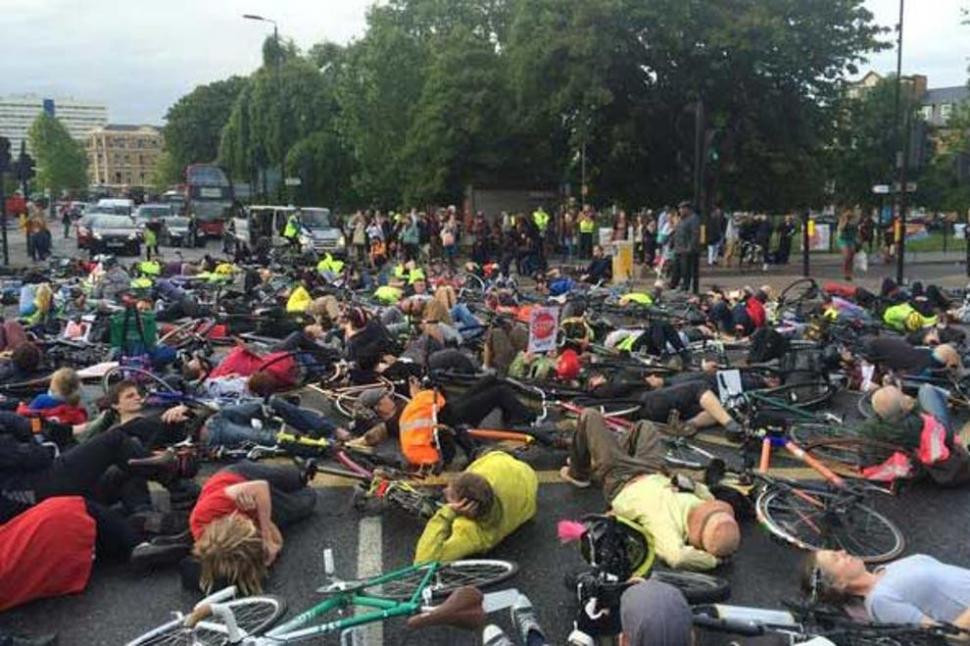

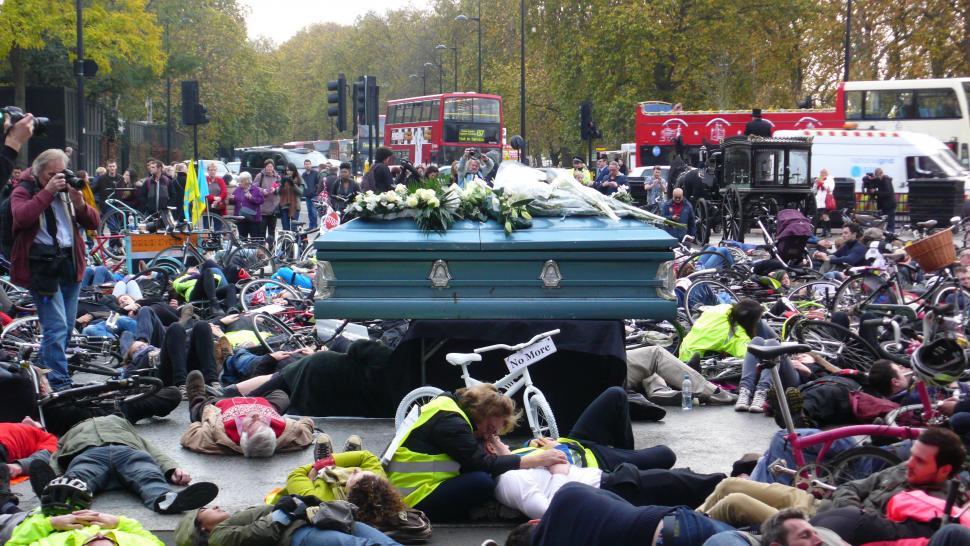
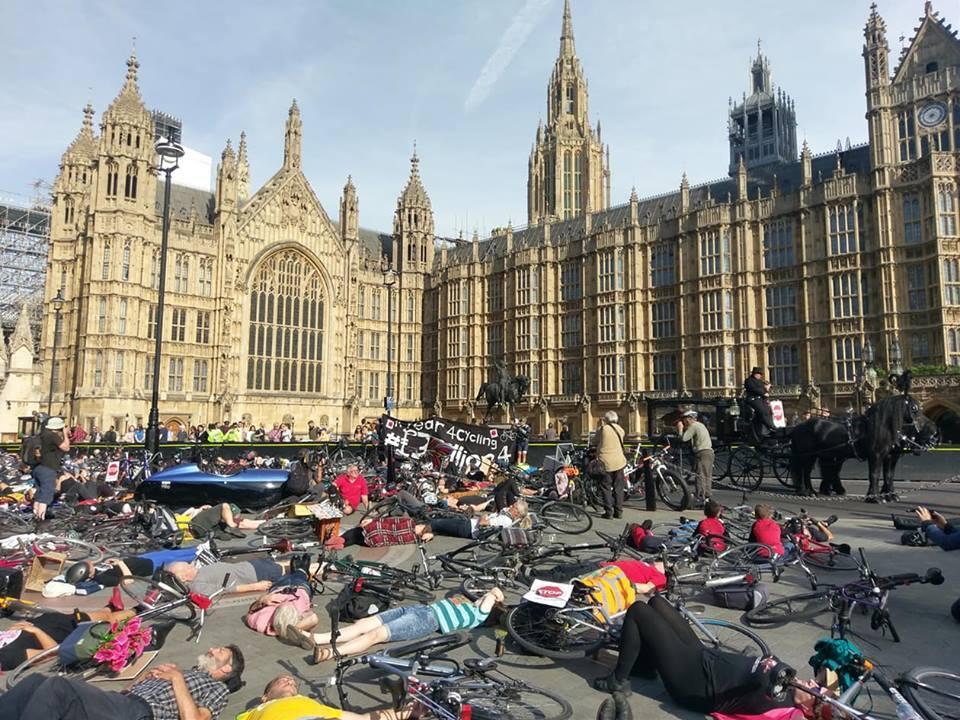
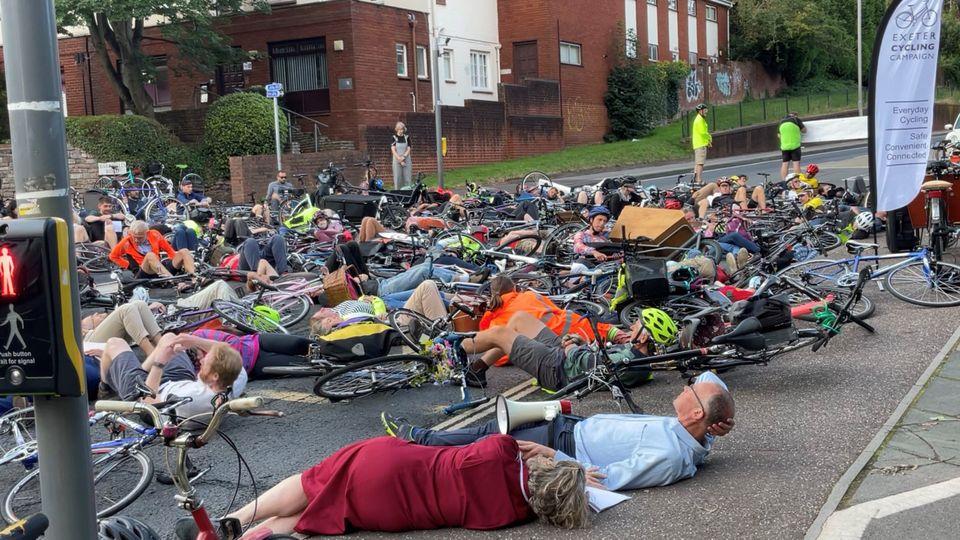
Add new comment
53 comments
Yes, but lawful business (destroying the planet)....
P.S.: I wrote that before reading the comments below.
Awesome work chap. I'm so glad that you are able to give up your time to support causes that need this kind of support.
Many of us moan and whinge, but too few of us actually do anything.
Thanks for doing something.
Excellent work Casper.
I too am heavily involved in advocacy, at both a local and national level and must say that direct action has a far greater effect on decision makers than any other form of action.
Is it worth going to prison for? Yes. If we don't grab the bull by the horns now we will look back in dismay in a decade or two as the consequences of our climate inaction come home to roost.
Insulate Britain seems a far cry from cycle campaigning. It seems one thing to protest/congregate where somebody has died, but insulate Britain's protests seem to be designed just to cause maximum havoc for people going about their lives. I can get behind cycle campaigning, but insulate Britain seems to be doing more harm than good for the general population and IMO is too divisive to work.
(I don't have a problem with insulation - their aim is laudable and I back that, but I can't get behind their methods).
Yes many say they arent challenging the target, but their methods are.quaetoonable. However what we do know is that disruptive direct action has historically delivered radical change in the past, and we need some serious radical change now.
I respect your opinion and what you're tryiny to achieve, but my underlying reasoning is I view the manner of insulate Britain's protests as more hindrance than help to their cause.
I prefer cycling to driving, but when I do drive, a road blockade for people threatened for their own safety or because of a recent catastrophic event is something I could understand. Usually they have no choice about the location as that's related to the incident. The insulate Britain protests - in choosing locations that are not similarly connected to their cause and thereby seem to just want to create as much disruption possible - would alienate me. There appears to be no empathy there with people trying to go about their business, and I think that leads to increased division. Just my thoughts on it.
Direct action can be very effective. The effects of global heating are much more serious than some people in cars being delayed for a few hours.
I'm not brave enough to sit on a sliproad with Insulate Britain, but I applaud them.
What positive changes have come about because of Insulate Britain's protests?
I can't think of any.
They've been disruptive, antagonistic and communicated awfully.
They've probably harmed the battle against climate change significantly by ossifying the position of many sceptics.
You really believe all that? No, I didn't think so
And if you ask what iota of proof you have for any of those statements, the answer would be zero.
As always your facts prove your previous statement to be wrong. You said:
Your link shows that 25% of the population at large support their action, rising to 49% amongst those who regard climate change as a top priority. Thank you for plugging yourself so neatly in the foot once again.
When it comes to swiss army knives, the Nigelov Garageski bot carries a potato peeler to a gun fight.
In a battle of wits, they're turning up unarmed
In fairness to Nige I think he meant 'how many *more*' as that was the phrase he used in his two previous examples and that would make a lot more sense
It's hardly a ringing endorsement of Insulate Britain that awareness of their protests leads to literally no increase in support but a huge increase in opposition.
They're basically doing the work for the climate change sceptics.
They can't even muster a majority amongst those who share their concerns. Time to pack in the nonsense before they do any more harm.
His link doesn't actually measure any rise in support or in opposition, nor does it show any evidence for his statements "If you meant how many more houses have been insulated as a result of their actions, the answer would be zero. If you meant how many more people have become environmentally conscious as a result of their actions, the answer would be zero."
The graph you posted shows that those who are aware of the protests are no more likely to support them than those unaware.
They are much more likely to oppose them though.
The effect is entirely negative.
That's not good for the climate change movement as a whole.
It doesn't show that. As Rendel said it doesn't tell us much of anything about a shift in opinion either way. To understand that, we'd need to know how much people supported the aims before they were prompted to think about it. That's pretty much an unanswerable question, because it would render itself void in the asking.
We also don't know anything about the composition of the two groups, and whether they're comparable. Perhaps those who are unaware of the protests also happen to be more likely to live in old drafty houses, and so are more inclined to be warm* to the ideas being promoted to start with, for example.
In any case, this looks to be one of YouGov's 'generate a bunch of PR for YouGov' polls, so should probably be treated with a large pinch of salt.
[*pun not intended, but I'll cheerfully take the credit for it.]
It shows exactly that. Look at the labels on the graph.
It's never going to be a perfect test but the results are clear enough to demonstrate the counterproductive nature of the protests.
It doesn't. For all we know, support among all groups was zero before the protests and before the poll, because no-one was really thinking about it. In which case the protests have increased support among those who've heard about them from 0 to 26%, and the poll has increased support among those who haven't heard of the protests from 0 to 26%.
Exactly this.
There is a column for those who are minimally/not aware of the protests.
There is a column for those who are aware of the protests.
Compare and contrast.
You're missing the point. The poll will influence its own results. We don't know how many (in either column, but most especially in the not aware column) hadn't considered the issues at all until they were polled, and then said 'well now I come to think about it, yes, I support this'. It doesn't tell us what the level of support is among those who are not aware of the protests and have not been polled.
So Schrödinger's poll then.
You can never know what someone's opinion is on something without asking them so I've no idea what point you're making.
From the best information we have there is zero increase in support for the protests amongst those who are aware of them compared to those unaware/minimally aware of them. There is a big increase in opposition.
Unless you have someway of measuring the opinions of people without actually asking them I think we're going to have to stick to the data we've got.
That is the point I'm making. It's pretty much an unanswerable question.
Even if it is the best information we have (I doubt that a throwaway YouGov poll is the best that can be found), it's still not good information. Sometimes you just have to admit that you don't have enough information to make an informed judgement.
And sometimes refusing to accept perfectly good evidence is just your own cognitive dissonance at work.
Whilst we do not know the effect of asking the question we can eliminate this unknown effect from our study through the use of a control group.
This is what has been done in this case.
Group A were exposed to the question AND the protests.
Group B were exposed to just the question.
If Group A and Group B are otherwise sufficiently similar then any difference in response can be reasonably attributed to the protests.
Unless you have evidence that the two groups are significantly dissimilar then the only reasonable response is to accept the result.
A slightly odd statement, given that I've already commented on this thread about how I personally think that IB's choice of tactics may well be limiting their effectiveness. I just don't believe that this particular graph adds any weight to that view.
That's rather arse-about-face. The onus should be on those relying on it as evidence to demonstrate that it is robust, not on others to demonstrate that it's not. Personally, I think the only reasonable response to the available information here is to embrace the uncertainty.
What exactly are you basing your uncertainty on?
Do you have any evidence to the contrary?
Do you have any evidence that the methodology was flawed?
If you don't have either then you can either base your opinion on the best available evidence or you can choose to not base your opinion on evidence.
What are you basing your certainty on? There's no methodology supplied.
All we're told is that it's based on a poll of relatively small number of people.
We also know that it's a poll from YouGov, whose MO is to churn out a lot of these polls to a fairly self-selecting group of respondents, not particularly to provide accurate information about public opinion, but primarily as a way of (a) compiling a lot of background information about the respondents as a way to select and segment them when they come to do their more robust, paid for studies, and (b) to generate a drip-feed of media stories to provide PR for YouGov.
I am basing my opinion on what I consider to be the best available evidence. I just don't agree that this poll, as presented here, is the best available evidence. And if it were the best available evidence, my assessment of it is that it's so weak that the opinion that should be formed on the basis of it is that we're unable to say anything meaningful about the impact of the protests.
I asked what your evidence was?
You claim to be basing your opinion on the best available evidence.
Which evidence is that?
The methodology is right there in the link.
It's a poll of a decent number of people who seem broadly representative of the British population and reasonably well matched given the context.
You're never going to get 5-sigma certainty in this field but unless you've got evidence to the contrary this is the best available.
Pages